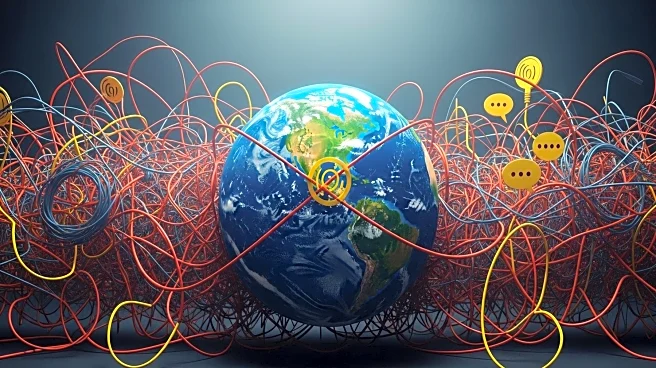What's Happening?
Recent discussions have brought to light the significant barriers in climate communication, particularly for non-English speaking communities. Despite the universal impact of climate change, access to information and understanding of climate issues are not equally distributed. A UCLA study during the Los Angeles wildfires revealed that communities with limited English proficiency faced challenges in comprehending alerts and information. This issue is compounded by the fact that most scientific publications and policy discussions are conducted in English, leaving many immigrant and rural communities excluded from vital climate conversations. Experts argue that this linguistic barrier prevents these communities from accessing critical information and participating in global climate solutions.
Why It's Important?
The exclusion of non-English speaking communities from climate discussions has profound implications for global climate action. These communities often possess unique, localized knowledge that could contribute to effective climate solutions. However, the language barrier isolates their insights from mainstream discourse, hindering comprehensive climate strategies. This situation underscores the need for inclusive communication practices that ensure all voices are heard. By addressing these barriers, policymakers and climate scientists can foster more equitable participation, potentially leading to more effective and diverse climate solutions. The current communication gap not only limits the dissemination of crucial information but also perpetuates inequality in climate resilience and adaptation efforts.
What's Next?
Efforts are underway to bridge the communication gap in climate discussions. Organizations like Climate Cardinals are working to make climate information accessible by translating scientific content into multiple languages. This initiative aims to empower local communities to engage in climate action and resilience building. Additionally, there is a growing call for climate forums and conferences to incorporate multilingual approaches, ensuring that non-English speaking populations can participate meaningfully. As awareness of these barriers increases, stakeholders are likely to push for more inclusive communication strategies, potentially reshaping how climate information is shared globally.
Beyond the Headlines
The linguistic barriers in climate communication reflect broader issues of inequality and access to information. This situation highlights the ethical responsibility of climate communicators to ensure that all communities, regardless of language, can contribute to and benefit from climate solutions. The exclusion of non-English speakers from climate discourse not only limits their ability to respond to climate threats but also undermines the potential for diverse and innovative solutions. Addressing these barriers requires a shift in how climate information is disseminated, prioritizing inclusivity and accessibility to foster global collaboration in tackling climate change.










